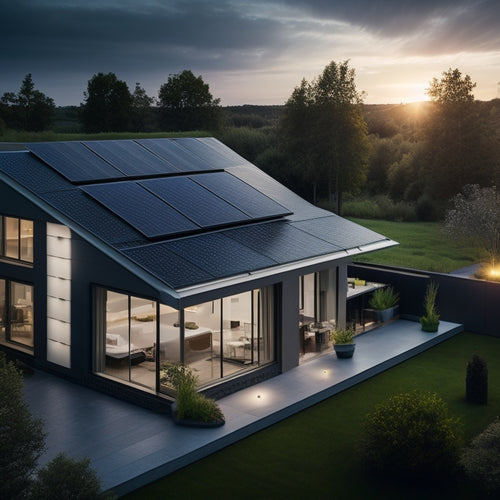
Most Efficient Solar Panels for Home
Share
When selecting the most efficient solar panels for your home, you should focus on models with maximum power density, such as Panasonic HIT-240, SunPower X-Series, and LG NeON 2, which can generate more energy per unit area, resulting in higher energy output and efficiency. These panels combine advanced solar cell materials with efficient systems to maximize energy yield. Strategic design, efficient energy harvesting, and performance in various conditions, such as high temperatures and low-light conditions, also play a significant role in achieving ideal energy output. Now, investigate the key features and benefits that make these solar panels stand out.
The Essentials
- High-power density solar panels generate more energy per unit area, maximizing energy output from available roof space.
- Look for panels with low temperature coefficients for efficient performance in high-heat conditions.
- Solar panels with high low-light sensitivity ensure energy harvesting during overcast days and maximize energy generation potential.
- Advanced solar cell materials, ideal installation techniques, and efficient storage systems optimize energy yield and enhance overall efficiency.
- Modern solar panels feature space-saving cell designs that generate more power per unit area while reducing thickness and weight, ideal for homes with limited roof areas.
Higher Energy Output Guaranteed
You'll benefit from solar panels that boast maximum power density, allowing you to generate more energy per unit area.
With a well-designed Solar Array, you can maximize your energy conversion rates through state-of-the-art technology, guaranteeing a reliable and efficient solution to generate renewable energy.
Additionally, energy yield optimization assures that your system operates at peak performance, even in varying environmental conditions.
Maximum Power Density
Higher energy output is assured when solar panels boast maximum power density. This means you get more energy from the same surface area, allowing you to generate more power from your rooftop. Maximum power density is achieved by using high-efficiency solar cell materials that convert sunlight into electricity more effectively.
| Solar Panel Model | Power Density (W/m²) |
|---|---|
| Panasonic HIT-240 | 215 |
| SunPower X-Series | 210 |
| LG NeON 2 | 205 |
| Trina Tallmax M10 | 200 |
When selecting solar panels, look for models with high power density ratings. This guarantees you're getting the most energy possible from your installation. Additionally, high-efficiency power conversion systems can further optimize energy output. By combining advanced solar cell materials with efficient power conversion, you can maximize your energy yield and enjoy greater freedom from the grid.
Energy Yield Optimization
As solar panels convert sunlight into electricity, energy yield enhancement plays a vital role in ensuring maximum energy output. You want to get the most out of your investment, and that's where optimization comes in.
It's about maximizing the amount of energy your solar panel system produces while minimizing losses. This is achieved through a combination of advanced solar panel materials, ideal installation techniques, and efficient energy storage systems like home battery storage solutions that allow you to store excess energy generated by your solar panels and use it during off-peak hours or emergencies.
Additionally, having a reliable storage solution enables you to optimize your energy consumption and reduce reliance on the grid. Optimizing energy yield also involves seamless grid integration, regular maintenance practices, and taking advantage of financial incentives.
Regulatory impacts, such as net metering laws, also play an essential role in ensuring you get the most out of your system. Additionally, consumer education and awareness about technological advancements in solar energy can help you make informed decisions about your system.
Increased Property Value Boost
You can expect a significant increase in your property's value when you install solar panels, which is a key aspect of renewable energy solutions that homebuyers are looking for.
In fact, solar power installation can also lead to energy efficiency, which is a major selling point for potential buyers.
Studies have shown that homes with solar panels sell for higher prices than similar homes without them, thanks to the appeal of energy efficiency upgrades.
Higher Selling Prices
A strategic investment in solar panels can greatly enhance your home's resale value, making it a highly attractive feature to potential buyers.
According to recent market trends, homes with solar panels sell for higher prices than those without. You can expect to recoup a significant portion of your installation costs through increased selling prices.
In fact, a study by the National Renewable Energy Laboratory found that solar panels can increase your home's value by up to $15,000. This is because buyers are willing to pay a premium for the long-term savings and environmental benefits that solar panels provide.
By installing solar panels, you're not only reducing your energy bills, but also increasing your home's appeal to potential buyers.
As a homeowner, you can reap the rewards of higher selling prices, making your investment in solar panels a smart financial move.
With solar panels, you're not only generating clean energy, but also generating more value for your property.
Energy Efficiency Upgrades
Solar-powered homes with energy-efficient upgrades command a premium in the real estate market, as these features collectively enhance property value more considerably than solar panels alone.
When you integrate energy storage systems, smart technology, and other upgrades, you're not only reducing your reliance on the grid but also increasing your home's appeal to potential buyers.
Government incentives can help offset installation costs, and with various financing options available, the upfront investment becomes more manageable.
Additionally, energy-efficient upgrades require minimal maintenance, ensuring long-term savings and a reduced environmental impact.
As consumer awareness of grid integration and sustainable living grows, the demand for energy-efficient homes will continue to rise.
Efficient Temperature Coefficient Matters
When you're evaluating solar panels for your home, you'll want to take into account the temperature coefficient, which affects their performance in high-heat conditions.
Look for high-efficiency solar panels that reduce energy bills and minimize environmental impact renewable energy systems, as they'll provide the most benefits in the long run.
A lower temperature coefficient guarantees your panels will maintain their efficiency even on scorching summer days, producing more power per hour of sunlight.
You should also look for panels that excel in low-light conditions, as this will impact their energy harvesting capabilities during periods of limited sunlight.
High-Temperature Performance
Operating at high temperatures can greatly impact your solar panel's performance, and understanding this impact is crucial for peak energy harvesting.
As a homeowner, you need to take into account how well your solar panels can handle high temperatures, especially during summer months when they're most needed.
A high-temperature coefficient indicates that your solar panels will lose efficiency as the temperature rises. This means that if your solar panels have a high-temperature coefficient, they'll produce less energy when it's hot outside.
To mitigate this, look for solar panels with efficient heat dissipation strategies and thermal management techniques. These features help to reduce the temperature of the solar panels, allowing them to operate at peak levels even on hot days.
When comparing solar panels, check the temperature coefficient rating. A lower rating indicates better high-temperature performance.
For example, a temperature coefficient of -0.4%/°C means that for every 1°C increase in temperature, the solar panel's efficiency will decrease by 0.4%.
Low-Light Energy Harvesting
You'll also want to reflect on your solar panels' performance in low-light conditions, as this can greatly impact your energy harvesting capabilities.
When evaluating solar panel technology, it's vital to take into account low light performance, as it directly affects the panel's ability to generate electricity during periods of reduced sunlight. Look for panels with high low-light sensitivity, measured by the efficiency percentage at 200 W/m² irradiance. This guarantees your system remains productive even on overcast days.
Efficient temperature coefficient also plays a significant role in low-light energy harvesting. A lower temperature coefficient means your panels will maintain their performance better in high-temperature conditions, which often occur during periods of low light.
This collaboration between low light performance and efficient temperature coefficient enables your solar panel system to maximize energy production, even when the sun isn't shining brightly. By prioritizing these factors, you can make certain your solar panel system consistently generates electricity, providing you with the freedom and independence you desire.
Wattage per Square Foot
When selecting solar panels for your home, you'll want to take into account the wattage per square foot, which directly affects the system's energy output.
High-efficiency all black solar panels sustainable solar systems can enhance the aesthetic appeal of your roof while providing renewable energy.
High-power density cells, for instance, can greatly increase the energy yield per unit area, making them an attractive option.
High-Power Density Cells
High-power density cells, engineered to maximize wattage per square foot, have revolutionized the solar panel industry by considerably increasing energy output while reducing the required installation area.
You'll benefit from more power generated per unit area, making them ideal for homes with limited roof space. These advanced cells are designed using innovative materials and state-of-the-art solar technology, allowing for more efficient energy conversion. As a result, you can enjoy increased energy independence and reduced electricity bills.
With high-power density cells, you can expect higher efficiencies, often above 20%. This means you'll generate more power from the same surface area, making them a great option for homes with smaller roofs or limited installation space.
Additionally, these cells are more durable and resistant to degradation, ensuring a longer lifespan and reduced maintenance costs. By choosing solar panels with high-power density cells, you'll be taking a significant step towards achieving energy freedom and reducing your carbon footprint.
Efficient Energy Harvesting
Efficient energy harvesting is achieved through the strategic design of solar panels, which enables maximum wattage per square foot.
You want to maximize the energy output of your solar panel system, and this is where efficient energy harvesting comes in.
The key is to optimize the panel's surface area to generate more power per unit area. This is measured in watts per square foot (W/ft²).
Thinner and Lighter Design
You'll notice that modern solar panels feature a space-saving cell design, which enables them to generate more power per unit area while reducing their overall thickness and weight.
This innovative approach allows for a more efficient use of rooftop space, making it ideal for homes with limited roof areas.
Space-Saving Cell Design
Thinner solar panels with space-saving cell designs are revolutionizing the way homeowners generate electricity. You're no longer limited by bulky and heavy solar panels that take up too much space. With innovative materials and compact installation, you can now generate more power in smaller areas.
| Panel Type | Thickness | Weight |
|---|---|---|
| Traditional | 40 mm | 20 kg |
| Thinner Design | 30 mm | 15 kg |
| Space-Saving | 20 mm | 10 kg |
These space-saving cell designs allow for more efficient use of your roof's real estate. You can now install more panels in the same area, generating more electricity and increasing your energy independence. This means you can enjoy the freedom to power your home, your way. With compact installation, you can also reduce installation costs and complexity, making it easier to go solar. Whether you're looking to save space or increase energy production, space-saving cell designs are the way to go.
Frequently Asked Questions
What Is the Average Lifespan of Solar Panels for Home Use?
You'll be pleased to know that solar panels for home use typically last around 25-30 years, depending on solar panel durability and regular solar panel maintenance, ensuring a worry-free investment in your freedom to utilize renewable energy.
Can Solar Panels Be Installed on a Metal Roof?
You're finally breaking free from the grid, but don't get zapped by installation woes! Yes, you can install solar panels on a metal roof, leveraging its advantages like durability and ease of cleaning, but consider specialized clamps and waterproofing to guarantee a secure, leak-free fit.
Do Solar Panels Work During Power Outages?
You're wondering if solar panels work during power outages; the answer lies in power outage functionality, which typically requires solar battery integration. Without it, your system won't function during outages, but with it, you'll enjoy uninterrupted energy independence.
Are Solar Panels Resistant to Hail and Extreme Weather?
You're wondering if solar panels can withstand Mother Nature's fury? Well, rest assured, most modern panels are built to resist hail damage and boast impressive weather durability, ensuring your power stays on even in extreme conditions.
Can I Install Solar Panels Myself to Save Money?
You can attempt a DIY installation to save money, but it's essential to weigh the cost savings against potential risks, such as voiding warranties, and guarantee you meet local electrical codes and permitting requirements.
Final Thoughts
As you maneuver through the solar panel market, remember that every percentage point of efficiency counts. It's like finding an extra $100 bill in your pocket - it may not seem like much, but it adds up. In fact, a study found that homes with highly efficient solar panels sell for an average of $15,000 more than those with less efficient systems. By choosing the most efficient solar panels for your home, you're not only reducing your carbon footprint but also padding your wallet.
Related Posts
-

Is This the Future of Alternative Energy Systems
Yes, alternative energy systems are shaping the future of energy. Innovations in solar and wind technologies are driv...
-

Best Solar Powered Flashlights for Emergency Situations
When you're choosing the best solar-powered flashlights for emergency situations, focus on their brightness, battery ...
-

Home Solar Battery
You're opting for a home solar battery that allows you to utilize the power of the sun during the day and use it at n...


